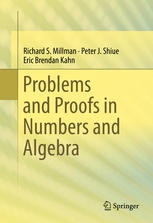

Most ebook files are in PDF format, so you can easily read them using various software such as Foxit Reader or directly on the Google Chrome browser.
Some ebook files are released by publishers in other formats such as .awz, .mobi, .epub, .fb2, etc. You may need to install specific software to read these formats on mobile/PC, such as Calibre.
Please read the tutorial at this link: https://ebookbell.com/faq
We offer FREE conversion to the popular formats you request; however, this may take some time. Therefore, right after payment, please email us, and we will try to provide the service as quickly as possible.
For some exceptional file formats or broken links (if any), please refrain from opening any disputes. Instead, email us first, and we will try to assist within a maximum of 6 hours.
EbookBell Team

4.1
80 reviewsFocusing on an approach of solving rigorous problems and learning how to prove, this volume is concentrated on two specific content themes, elementary number theory and algebraic polynomials. The benefit to readers who are moving from calculus to more abstract mathematics is to acquire the ability to understand proofs through use of the book and the multitude of proofs and problems that will be covered throughout. This book is meant to be a transitional precursor to more complex topics in analysis, advanced number theory, and abstract algebra. To achieve the goal of conceptual understanding, a large number of problems and examples will be interspersed through every chapter. The problems are always presented in a multi-step and often very challenging, requiring the reader to think about proofs, counter-examples, and conjectures. Beyond the undergraduate mathematics student audience, the text can also offer a rigorous treatment of mathematics content (numbers and algebra) for high-achieving high school students. Furthermore, prospective teachers will add to the breadth of the audience as math education majors, will understand more thoroughly methods of proof, and will add to the depth of their mathematical knowledge. In the past, PNA has been taught in a "problem solving in middle school” course (twice), to a quite advanced high school students course (three semesters), and three times as a secondary resource for a course for future high school teachers. PNA is suitable for secondary math teachers who look for material to encourage and motivate more high achieving students.